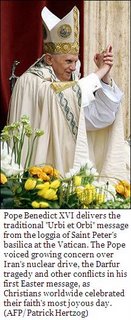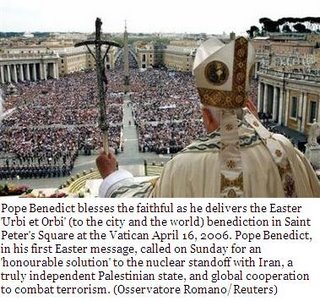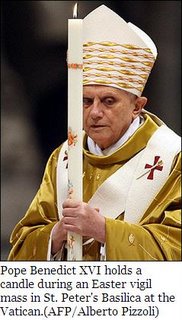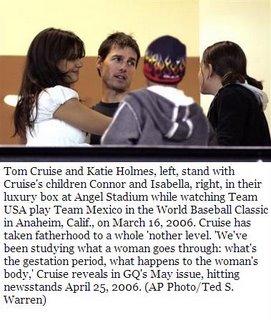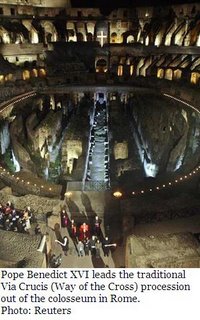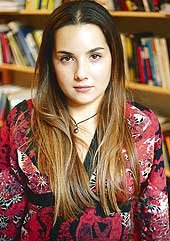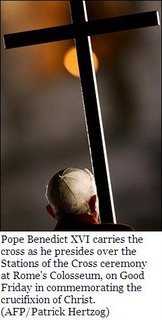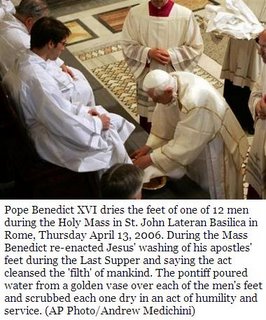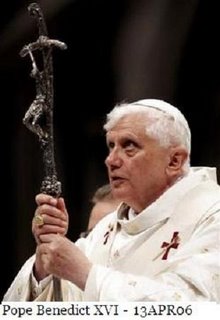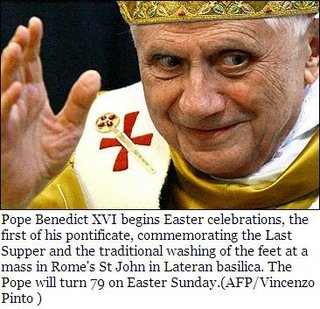FRANCES D'EMILIO
Associated Press Writer
 VATICAN CITY - In his first Easter message as pontiff, Pope Benedict XVI on Sunday urged nations to use diplomacy to defuse nuclear crises — a clear reference to worries over Iran — and prayed that Palestinians would one day have their own state alongside Israel.
VATICAN CITY - In his first Easter message as pontiff, Pope Benedict XVI on Sunday urged nations to use diplomacy to defuse nuclear crises — a clear reference to worries over Iran — and prayed that Palestinians would one day have their own state alongside Israel.On Christianity's most joyous day — which happened to fall on Benedict's own 79th birthday — the pontiff also prayed for Iraq's relentless violence to cease.
From the central balcony of St. Peter's Basilica, Benedict reflected on the globe's troubled regions shortly after he celebrated Easter Mass in St. Peter's Square, which was packed with 100,000 pilgrims and tourists on a breezy, hazy day.
"Today, even in this modern age marked by anxiety and uncertainty, we relive the event of the Resurrection, which changed the face of our life and changed the history of humanity," Benedict said in the traditional papal "Urbi et Orbi" message — Latin for "to the city and to the world."
On Easter, Christians celebrate a core belief of their faith — that Jesus rose from the dead following his crucifixion. Orthodox Christians in Russia and elsewhere will celebrate Easter on April 23.
Benedict made note of recent developments that have raised fears Iran might be working toward building a nuclear arsenal.
"Concerning the international crises linked to nuclear power, may an honorable solution be found for all parties, through serious and honest negotiations," Benedict said without naming any country.
Iranian President Mahmoud Ahmadinejad recently said his country had successfully enriched uranium using 164 centrifuges, a significant step toward large-scale production of material that could be used to fuel nuclear reactors for generating electricity or to build atomic bombs.
Iran insists it only wants the peaceful use of nuclear power, but Western nations suspect Tehran wants to develop weapons and are demanding a halt to enrichment activities.
Pilgrims marking Easter also filled the streets of Jerusalem's Old City. The alleys were more crowded than in recent years, reflecting a drop in Palestinian-Israeli violence.
The Latin Patriarch of Jerusalem, Michel Sabbah, who is the leading Roman Catholic official in the Holy Land, celebrated Mass in the dark, incense-filled Church of the Holy Sepulcher, built on the spot where many Christians believe that Jesus died on the cross.
After leading black-robed priests into the church singing the Lord's Prayer, the Palestinian-born patriarch lit worshippers' candles, which gradually illuminated the painted dome ceiling erected in the Crusader era.
"This is like a dream come true for us to be here in the Holy Land," said Rona Arida, 29, a Philippine worker in Israel, after praying with her friends at the church. "I prayed for all of my family back home."
At the Vatican, Benedict was interrupted by applause when he said of Iraq: "may peace finally prevail over the tragic violence that continues mercilessly to claim victims."
"I also pray sincerely that those caught up in the conflict in the Holy Land may find peace, and I invite all to patient and persevering dialogue, so as to remove both ancient and new obstacles," the pontiff said.
There has been heavy pressure from abroad on the Hamas-led Palestinian government, which was elected in January, to renounce violence and recognize Israel's right to exist.
"May the international community, which reaffirms Israel's just right to exist in peace, assist the Palestinian people to overcome the precarious conditions in which they live and to build their future, moving toward the constitution of a state which is truly their own," Benedict said.
The pope lamented that the humanitarian crisis in Sudan's Darfur region was "no longer sustainable."
He denounced the "deplorable scourge of kidnappings" in Latin America, where, he said, millions of people should have better living conditions and democratic institutions need to be "consolidated in a spirit of harmony."
As Mass began, a brisk breeze ruffled the pope's gold-colored vestments and the crimson feathers atop the helmets of Swiss Guards as he strode up the center to the square to take his place at a canopied altar on the steps of St. Peter's Basilica.
The pope offered holiday wishes in 62 languages and gave his blessing.
Among the prayers read by faithful during the Mass was a wish, in French, that the pope receive a birthday gift of "serene" days.
Benedict's predecessor, John Paul II, died six days after Easter last year, and was so weak he was unable to address faithful in the square on Easter, only raising his hand in blessing.
Benedict looked tired during Sunday's Mass. He had had only a few hours to rest after leading a long Easter vigil ceremony Saturday night in St. Peter's Basilica that lasted past midnight.
After a packed schedule of Holy Week ceremonies, Benedict was heading to the papal retreat in Castel Gandolfo, a hill town near Rome, where he planned to give pilgrims and tourists his blessing Monday at the start of a brief vacation.
This Post's Link
